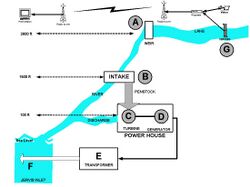Engineering:Malibu Hydro
| Malibu Hydro Power | |
|---|---|
| <mapframe zoom="5" frameless="1" align="center" longitude="-123.87777777778" latitude="50.144444444444" height="200" width="300">{"type":"Feature","geometry":{"coordinates":[-123.87777777777777,50.144444444444446],"type":"Point"},"properties":{"marker-color":"#5E74F3","title":"Malibu Hydro","marker-symbol":"industrial"}}</mapframe> | |
| Country | Canada |
| Location | Jervis Inlet, British Columbia |
| Coordinates | [ ⚑ ] : 50°8′40″N 123°52′40″W / 50.14444°N 123.87778°W |
| Status | Operational |
| Owner(s) | Malibu Club in Canada |
| Thermal power station | |
| Turbine technology | Micro hydro |
| McCannel Creek Dam | |
|---|---|
| Official name | Malibu Hydro Dam |
| Location | Jervis Inlet, British Columbia, Canada |
| Dam and spillways | |
| Impounds | McCannel Creek |
| Reservoir | |
| Creates | McCannel Lake |
Malibu Hydro System was designed to provide electricity to the Malibu Club in Canada. This hydro system starts from a high alpine lake where water is diverted from the lake through a steel penstock to a power house nearly 1,250 feet (380 m) below near the shore of Jervis Inlet. The flow of water turns a pelton wheel which is attached to a generator to create electricity. The electricity is then transmitted to camp by a submarine cable running under Jervis Inlet at a high voltage to reduce losses. Power is then distributed throughout camp on the existing and upgraded electrical system.[1]
Sources
The hydro turbine is feed by a yearlong creek called McCannel Creek, which is directly across Jervis Inlet from Malibu. The creek's source is McCannel Lake, at an elevation of 2,600 feet (790 m). At the outlet of the lake, a dam was built to maintain the lake level and control the flow of the creek.
Weir (Item A)
A small weir type dam was built at the lake outlet, and, by limiting the discharge into the creek, aids in maintaining the lake level. The weir has a large pipe and valve in its base to pass the minimum 2 cubic feet per second (0.057 m3/s) required to maintain the creek. This is in addition to the water which will be spilled to create power.
Intake (Item B)
Water regulated at the lake will flow down the creek from the 2,300-foot (700 m) level to the 1,200-foot (370 m) level. Here a second weir was built across the creek that forms a large deep pool from which the 12-inch (300 mm) penstock draws water at a rate of up to 7 cu ft/s (0.20 m3/s).
Power House (Item C & D)
The power house contains the turbine, generator, and the necessary equipment to control and distribute the electricity for Malibu. It is located a short distance above the beach. The following diagram and table explains what happens once the water flow reaches the Power house (read the diagram right to left)
| Item | Process | Function | Measure | Parameter |
|---|---|---|---|---|
| A | Jet & spear valve | Intake water velocity | Pressure at valve in Penstock (PSI) | 10-620 PSI |
| B | Deflector | Deflects water flow away from turbine | Angle position of deflector (controlled by governor) | 0° - 90° Degrees |
| C | Turbine | Pelton wheel turns in direction of water flow | How fast the turbine is turning (RPM) | Fixed (rpm) |
| D | Shaft | Distributes turning motion of turbine to the generator | How fast the shaft is turning | Fixed (rpm) |
| E | Generator | Generates the three phase AC electricity | The frequency output generated | = 60 Hz |
| F | Governor (ELC) | Maintains even load on Generator and flow on turbine | Frequency sample either from shaft, or generator, or switch gear | = 60 Hz |
| G | Switch gear | Breakers to break up flow if necessary | Halts flow of electricity if too high | --- |
| H | Transformer | Steps the voltage up to be transferred to camp | --- | 600 V – 14000 V |
Power Line (Item E)
Transformers at the hydro generator raise 600 volts to 15,000 volts for transmission. Power is transmitted across Jervis inlet, a distance of two miles (3 km) via an underwater power line consisting of three parallel conductors. On the Malibu side of the inlet, a transformer steps the 15,000 volts down to 120 and 208 volts for use at the camp.
History
It began installation in 2005.
References
 |


